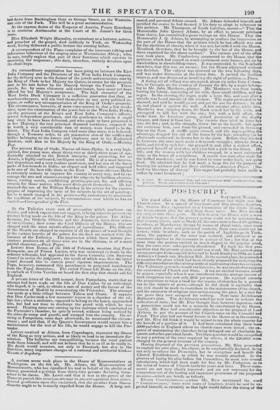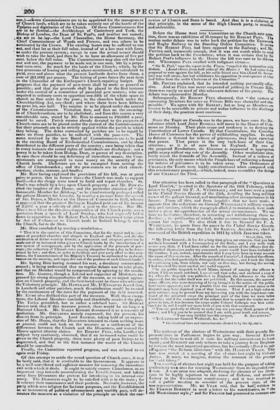S ATIIRDAN Ni The grand affair in the House of
Commons last night was the Church-rates. In a speech of two hours and fifty minutes duration, Mr. SPRING Bice exponmdcd to a Committee of the whole house,
the Gove:stment plan for abolishing those rates. Mr. Rice divided
the subject into three parts. Ile first treated the House with a Wage of details to prove that the preset.t system could not be maintained that in many places, such as Sheffield, the rates were refused altogether; in others, as Manchester, though by means of plural votes, rates were imposed after fierce and protracted contests, those rate: could not be levied ; while in others, such as the parish of ApplethoTe in York- shire, the payment of the rates was resisted, and enforced at an enormous expense to the recusants in a count of law ; but that at the same time the process excited so much disgust in the popular mind, that the rates were subsequently abandoned. To back his first pro- position that the present system could not stand, Mr. Rice quoted some strong passages from a speech delivered by Lord Stanley in 1834, on Lord Althorp's Church-rate Abolition Bill. In the second place, he proceeded to examine the plans which had been already proposed for removing the difficulty attendant on theexisting mode of maintaining churches in repair. The Voluntary system lie would not listen to ; he was resolved to support the connexion of Church and State. A tax on clerical incomes would be unjust, especially when it was considered that the average income of each clergyman was now roily 285/. per annum. lie rejected entirely the proposition to raise a fund for the repairs of churches by a general tax on the renters of pews,—though he did think it equitable that the rich should be made to contribute to the maintenance of the church, and the extension of religious instruction among the poor, by a relit for the pews they now occupied for nothing. Next came Archdeacon Bathurst's plan. The Archdeacon asked for new laws to enforce the collection of rates ; but Mr. Rice thought that, however ingenious, such a proposition could not for a moment be entertained by the House. Lastly, Mr. Rice had considerable objection to the proposal of Lord Alrhorp to put the amount of the Church-rates on the Consolid ,ted Fund. That plan had not found favour in the House or in the country; and Mr. Rice did think it would be unjust to tax the whole country for the benefit of a portion of it It had been calculated that there were .5000 parishes in England where no church-rates were levied ; the ex- pense of maintaining the churches being defrayed out of charitable be- quests and other parochial funds. Yet these parishes would be compelled to pay a portion of the rates required by others, if the 2:40001. were charged on the general revenue of the country.
Having disposed of the previous proposition, Mr. Rice proceeded to explain his own plan • his object, as he emphatically declared, being not only to relieve the Dissenters, but to strengthen and benefit the Church Establishment, to which he was warmly attached. In the process of laying his plan before tire Committee, he went into several calculations, which had been made for him by Mr. Finlayson, as to the value of leases of Church lauds for years and lives. These state- ments are not very clearly reported ; and are not necessary fur the comprehension of the leading and important provisions of the proposed measure—which are briefly as follows. Eleven Commissioners—(:when Mr. Rive mentioned the woe(' " Commissiotiers," there were roars of laughter, which he said he ex- pected himself, as certainly as that light would follow the rising of ths
sun,)-aeteven Commissioners are to be appointed fur the management of Church lands, which are to be taken entirely out of the hands of the Pealates and dignitaries of the Church. Of these Commissioners five are to be Clerical—the Archbishop's of Canterbury and York, the Bishop of London, the Dean of St. Paul's, and Another not named; six are to be.lay—the Lord Chancellor, the Home Secretary, the Chief Commissioner of Woods and Forests, and two others to be nominated by the Crown. The existing leases may be suffered to run out, and then let at their full value, instead of at a low rent with fines, " as under the present system; except in case the actual tenant should wish to take the land, and then he is to have an allowance of five per cent. below the full value. The Commissioners may also sell the land out and out, the payment to be made not in one sum, lint by a perpe- tual corn-rent. So much for the lands of the Church ; which, by the two processes of leasing and selling above-mentioned, are calculated to yield, over and above what the present landlords derive from them, a sum of 261,0001. per annum. The letting of pews forms the next item in the Chancellor of the Exchequer's Church-repairing budget. He proposes that the payment of pew-rents shall be made as general as possible ; and that the proceeds shall be placed in the first instance under the control of a committee of parochial pew. renters ; who are
required-in ordinary cases to apportion one-fifth of the whole space in church to free seats for the poor ; in the churches built under the
Chtirchbuilding Act, one-third; and where there have been hitherto no pews let, one. half. The surplus is to be placed under the control of the Commissioners. Visitation fees, and fees on the sweating.
in of Churchwardens, are to be abolished; and from this source a very considerable sum, stated by Mr. Rice to amount to 180,0001. a year, would be saved. Parish estates already devoted to the purposes of Cburch.rates are to be placed under the control of the Commissioners, but their proceeds are to be strictly applied within the parish to which they belong. The debts contracted by parishes are to be repaid by rates on those parishes, to be collected with the poor-rate. The
sums received by the new Board of Commissioners are to be paid to the existing Board of Ecclesiastical Commissioners, mut by them
distributed to the different parts of the country ; care being taken that in every instance the vested rights of individuals are discharged : not a penny is to be taken from Bishop, Deun, or parson of any description.
In case there should be any deficiency of immediate means, the Com- missioners are empowered to raise money on the security of the Church lands. Dissenters are to be exempted from serving the office of Churchwarden ; and the pew-renters are to elect church. wardens. clerks, sextons, and beadles.
Mr. Rice having explained the provisions of his bill, was at great pains to prove, that inn former times the Church was made to support itself—that the clergy were taxed to build and repair churches. St. Paul's was rebuilt by a levy upon Church property: and Mr. Rice ex. cited the laughter of the House, and the particular attention of " the honourable Member for Sibihrap," as he (inadvertently perhaps) called the gallant Member for Lincoln, by reading it passage limn the speech of Air. Boyes, a Member of the House of Commons in 1601, whence it appeared that the greatest Bishop in Euglitial paid out of lik income of 2,200/. a year a subsidy of 50t1. a year to the Queen. But Mr. Rice's best hit at the threatened opposition of the Church party, was a
quotation from a speech of Lord Stanley, who had exptessly laid it down in opposition to Sir Robert Peel, that the improved value. given by Act of Parliament to Church lands in Ireland belenged, nut to the Church, but to the State.
Mr. Rice concluded by moving a resolution- " That it is the opinion of this Committee, that for the repair and ma;inte• mance of parochial churches and chapels in England and Wales, and ale, doe celebration of divine worship therein, a permanent and adequate provision lie made out of an increased value given to Church lands, by the introduction of a new system of management, and by the application of the proceeds of pew- rents ; the collection of Church •rates ceasing altogether from a day to be dtter-
mined by law ; and that, in miler to facilitate and give early effect to this reso- lution, the Commissioners of his Majesty's Treasury be authorized to make ad-
vances on the security, and repayable out of the produce of such Chinch lands."
Mr. Spring Rice having resumed his seat, a desultory conversation ensued ; it being utidei stood that no regular debate was to take place,
and that no Member would be compromised by agreeing to the resolu-
tion. Mn. GORING, though a Liberal and supporter of Ministers, ex- pressed his strong disapprobation of the measure, as an unjust aggres-
sion on Church property, and the first instalment to those who advocate
the Voluntary principle. Mr. HAWES and Mn'. D'EeNcouter feared that, in Lambeth and other parishes, much di-satisfaction would be mated
by the continuance of the rates for the payment of the debt incurred. Mr. Erase also disliked this part of the measure. With these excep- tions, the Liberal Member. cordially and thankfully received the plan.
The Tories grumbled, but in rather a subdued tone. Sir lions!uT Incdas said, that if this measure passed, there would be no longer a Nationtil Church. Mr. GALLY KNIGHT dellOtHICed it as a measure of spoliation. Mr. GOULBURN merely expressed, for the present, his dissent from its principle. Lord SANDON, taking hold of an expres- sion of Mr. Hume, that the Dissenters intended to claim nothing more at present, could not look on the measure as a settlement of the differences between the Church and the Dissenters, and wanted the House against ulterior claims. Sir ROBERT PEEL, who handled the subject very cautiously, observed, that if an increased value could be given to the Church property, there were plenty of poor livings to be augmented, and that in the first instance the winos of the Church should be consulted.
Finally, the Committee reported progress, and was ordered to sit again next Friday.
Of this attempt to settle the vexed question of Church•rates, it may be fairly said, Oita it is creditable to the Government. It appears to
be in well-considered and sufficient measure for removing tine immediate
evil with which it deals. It ought to satisfy sincere Churchmen, us an important step towards unsecularizing the Esteblishment, and taking away from 1Jissenters the pretext fur interfering in its internal eco- nomy. The Dissenters ought to be satisfied with it in the main ; fur it relieves their consciences and their pockets. No doubt, however, the
party which uses religion for factious purposes, and the Establishment as an instrument of political advancement .snd worldly gain, will de- nounce the measure as a violation of the principle on which the con-
nexiou of Church and State is based. And that it is a violation of that principle, in the sense of the High Church party, is manifest and undeniable.



























 Previous page
Previous page